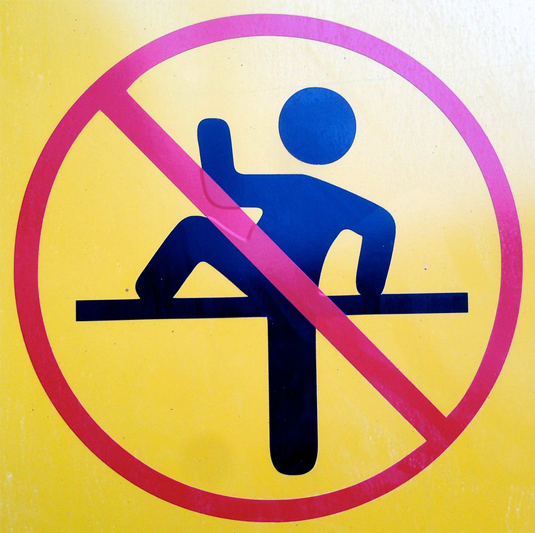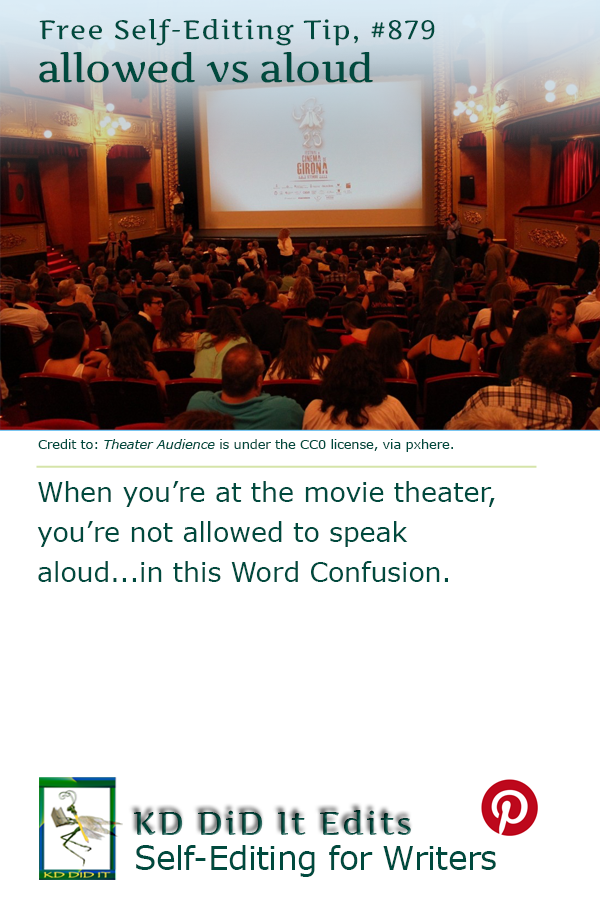Are you allowed to say that aloud of this pair of heterographs (a subset of homophone)?
While both are adjectives, allowed is only used in physics, as an adjective. Aloud, as an adjective is postpositive, which means it comes after the noun it describes. Yep, as you can imagine, neither adjective is used very often by, ahem, normal people.
With that out of the way, allowed is a verb, which is an action.
Aloud, on the other hand, is an adverb, which describes a verb (or adjective or adverb).
Word Confusions…
…started as my way of dealing with a professional frustration with properly spelled words that were out of context in manuscripts I was editing as well as books I was reviewing. It evolved into a sharing of information with y’all. I’m hoping you’ll share with us words that have been a bête noir for you from either end.
If you found this post on “Allowed versus Aloud” interesting, consider tweeting it to your friends. Subscribe to KD Did It, if you’d like to track this post for future updates.
| Allowed | Aloud |
|---|---|
| Credit to: Apple Dictionary.com; Collins Dictionary: aloud; Dictionary.com: allowed, aloud; Lexico.com: aloud; The Free Dictionary: allowed | |

No Gymnastics Allowed by Alan Levine is under the CC BY 2.0 license, via Flickr. |

Girl Aloud by rokfoto is under the CC BY-SA 2.0 license, via Wikimedia Commons. |
| Part of Grammar: | |
| Past tense or past participle for allow
Adjective 1; Verb 2, intransitive, transitive, & reporting Third person present verb: allows |
Adjective, postpositive; Adverb |
| Adjective: [Physics] Involving a change in quantum numbers, permitted by the selection rules Verb, intransitive:
To permit something to happen or to exist
Verb, transitive:
Give the necessary time or opportunity for
Give as one’s share
To permit by neglect, oversight, or the like To take into consideration, as by adding or subtracting
[Older use] To say
[Archaic] To approve
Verb, reporting:
|
Adjective, postpositive: [British] In a normal voice
[British] In a spoken voice
[Archaic] In a loud voice Adverb:
[Archaic] Loudly
|
| Examples: | |
| Adjective: It was an allowed transition. “Certain ranges of energies between two such allowed bands are called forbidden bands, i.e., electrons within the solid may not possess these energies” (Allowed Band). ” Allowed transitions are those that have high probability of occurring, as in the case of short-lived radioactive decay of atomic nuclei” (Editors). Verb, intransitive: The house was demolished to allow for road widening. Income rose by 11 percent, allowing for inflation. He spent more than he was allowed. She allowed that she might have been too suspicious. Verb, transitive: He was allowed his first sip of Scotch and soda. The river was patrolled and few people were allowed across. The village allowed Sunday shopping. Helen allowed two inches extra for shrinkage. There is a reservoir with no hunting or overnight camping allowed. They agreed to a ceasefire to allow talks with the government. He stopped for a moment to allow his eyes to adjust. We allowed an hour or so for driving. They allowed him $100 for expenses. Someone allowed this door to remain open. Father allowed this could have happened. We allowed he’s straight. You’re allowed to fish here. Verb, reporting: “Could happen,” she allowed indifferently. Lincoln allowed that he himself could never support the man. I allowed he was right. Mother allowed that we’d better come in for dinner. |
Adjective, postpositive: “Last week viewers saw her fighting back tears as a letter from her mum was read out aloud” (The Sun). “A delightful tale to read aloud with adorable characters” (The Sun). “Remember to say his name aloud” (Sunday Times). Adverb: It’s an error in judgment so colossal that it can’t even be whispered aloud. A mantra is the name of a sacred deity or a sacred phrase that you repeat silently or aloud. He was humming the song aloud and loudly, louder in fact than any man would have hummed it had he expected to bump into another human being. She wept aloud, the room filled with her cries of pain. Miranda was weeping aloud with the infant in her arms, as was Alannis standing beside her young lord. They could not speak aloud in the library. |
| Derivatives: | |
| Adjective: unallowed Adverb: allowedly |
|
| History of the Word: | |
|
Middle English from a combination of Old English a- (unstressed form of on expressing manner) + Old English hlūd, which is of West Germanic origin and related to the Dutch luid, the German laut, from an Indo-European root meaning hear, shared by the Greek kluein meaning hear, klutos meaning famous and the Latin cluere meaning be famous. |
C’mon, get it out of your system, bitch, whine, moan…which words are your pet peeves? Also, please note that I try to be as accurate as I can, but mistakes happen or I miss something. Email me if you find errors, so I can fix them…and we’ll all benefit!
Satisfy your curiosity about other Word Confusions by exploring the index. You may also want to explore Formatting Tips, Grammar Explanations, and/or the Properly Punctuated.
Resources for Allowed versus Aloud
“Allowed Band: Solid-state Physics.” Encyclopædia Britannica. n.d. Web. 15 May 2020. <https://www.britannica.com/science/allowed-band>.
The Editors of Encyclopædia Britannica. “Transition: Atomic Physics.” Encyclopædia Britannica. n.d. Web. 15 May 2020. <https://www.britannica.com/science/transition-atomic-physics>.
The Sun. 2016.
The Sunday Times. 2009.
Pinterest Photo Credits:
Theater Audience is under the CC0 license, via pxhere.


